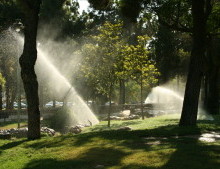
Water and greenery are not a problem for Israel thanks to science, technology, and Heavenly blessing. Illustrative. By Joshua Spurlock
Israel is a world leader in water resources, having made what was once a desert and swap-like territory into a garden—and they want to do more to share that with others. Israeli Prime Minister Benjamin Netanyahu, while at Expo Milan in Italy, noted that Israel and Italy are working together to help the agriculture of an African country. But he wants to expand that.
Asked Netanyahu, “Why one? Why not twenty? Why not thirty? If we pull our resources, our knowledge, our technology together, we can help many, many countries in Africa have not only better agriculture but a better life, and this is one of the key areas that I’m going to discuss” in his visit with Italian Prime Minister Matteo Renzi.
In the comments, which were released by Netanyahu’s office, the Israeli leader highlighted the great strides the Jewish state has done to improve their water situation. “We have ten times more population than we had when the state was founded 67 years ago and we have half the rainfall,” said Netanyahu. “Yet Israel has no water problems because we were able to solve this.”
Among the water areas upon which Israel has worked include desalinating ocean water and drip irrigation. And that’s not even counting what they do with the wastewater. “We’re the world’s leader in wastewater recycling,” said Netanyahu. “We recycle about 80 percent of our wastewater. I think number two is about 25 percent.”
Israel has not only long been a pioneer in water use, but they have also shared it and many other benefits. While they are currently working with Italy in one African nation, Israel’s Agency for International Development Cooperation, or MASHAV, has identified 12 different African nations for assistance in areas such as food, water, education, healthcare and more.
(By Joshua Spurlock, www.themideastupdate.com, August 27, 2015)
